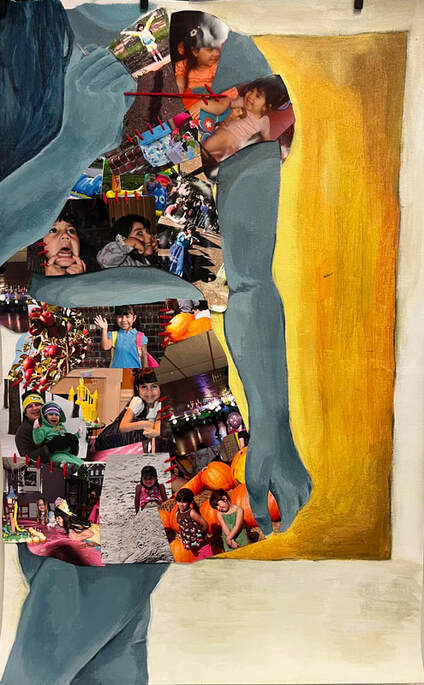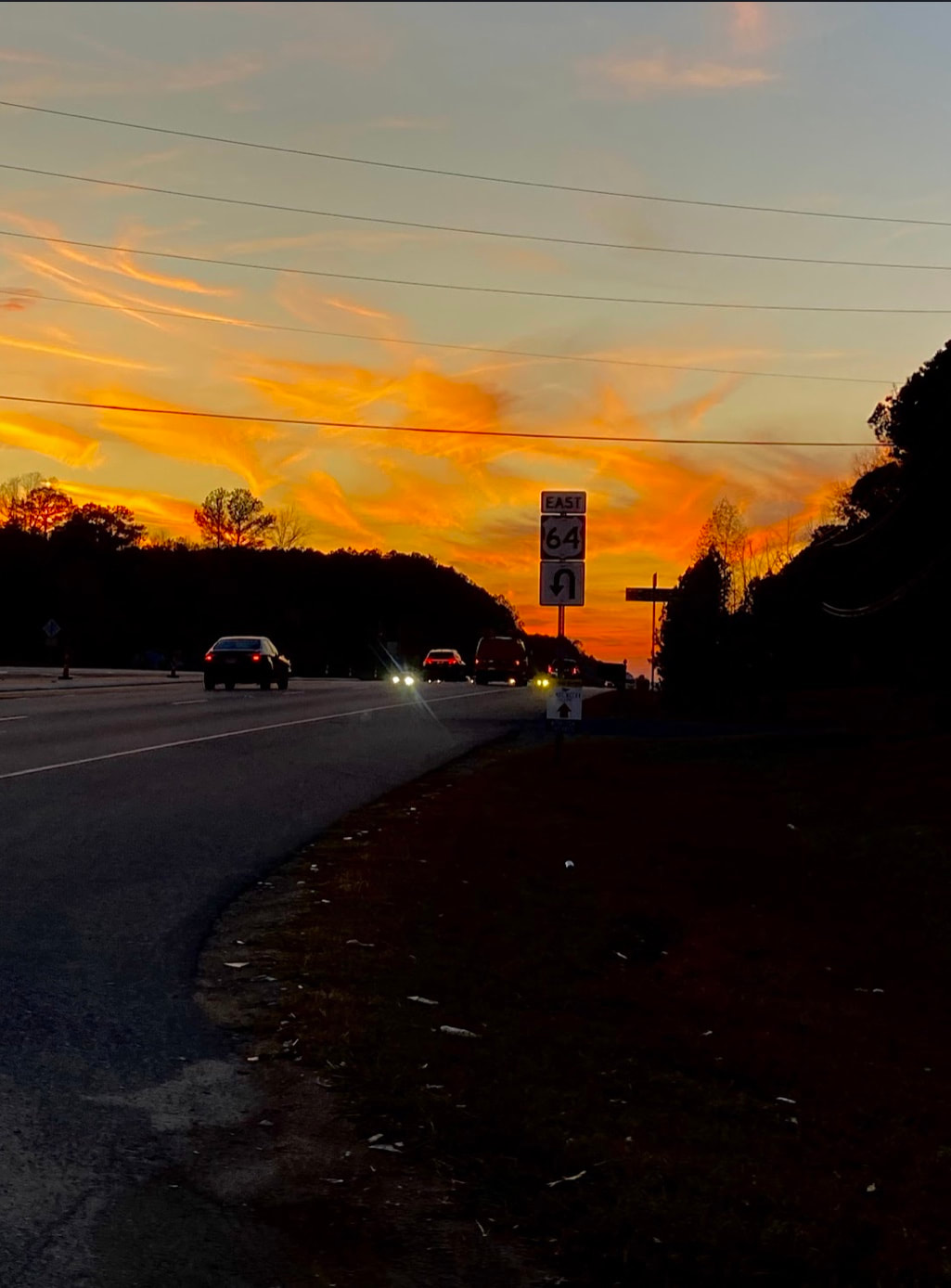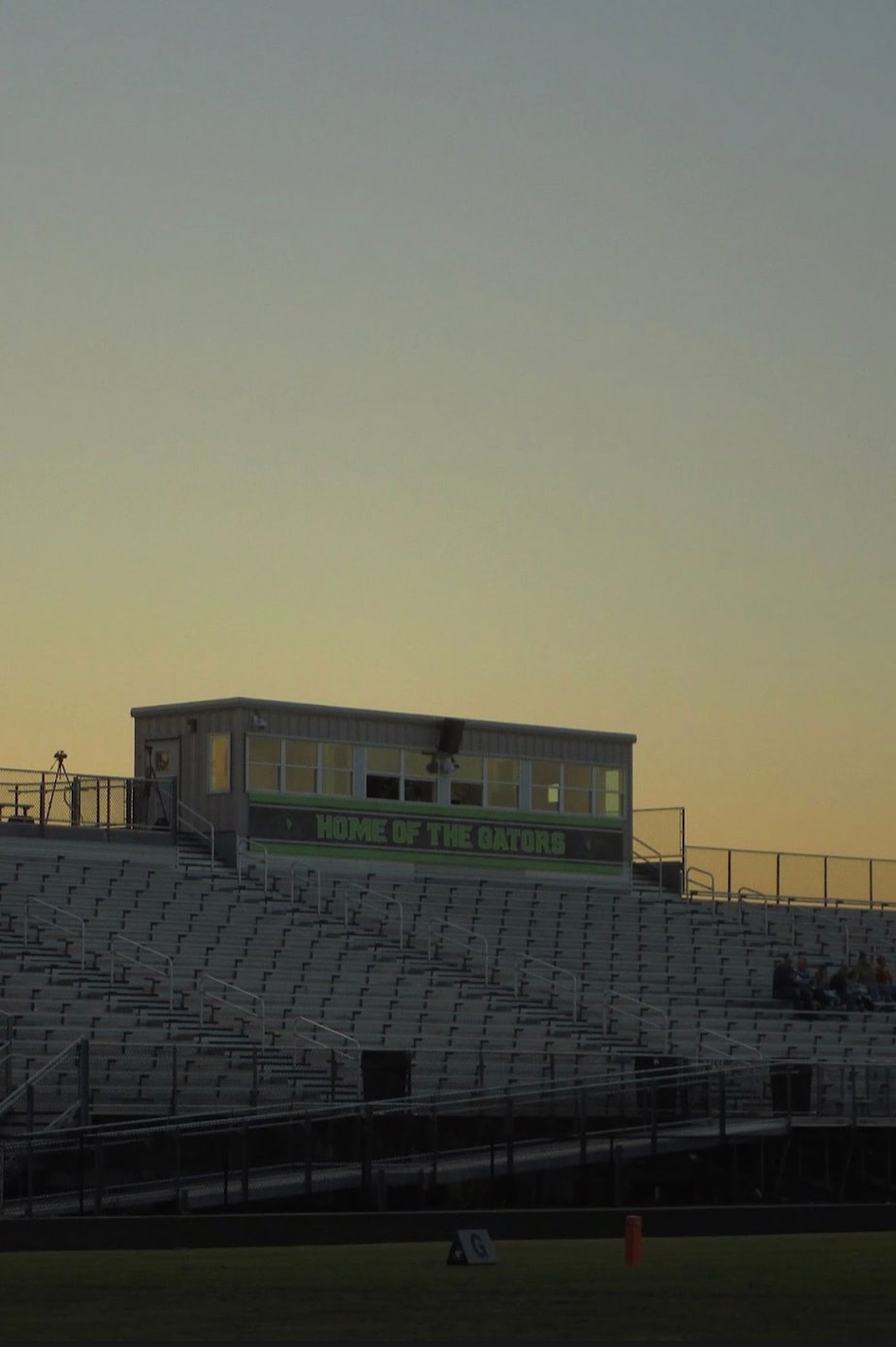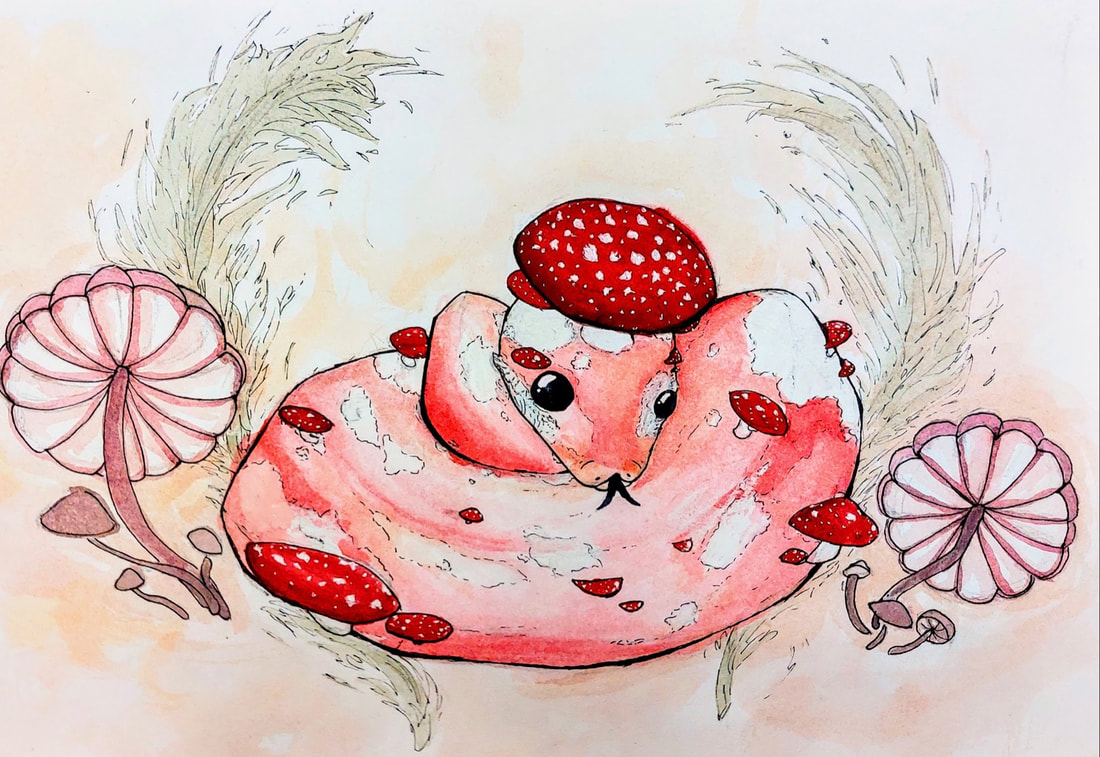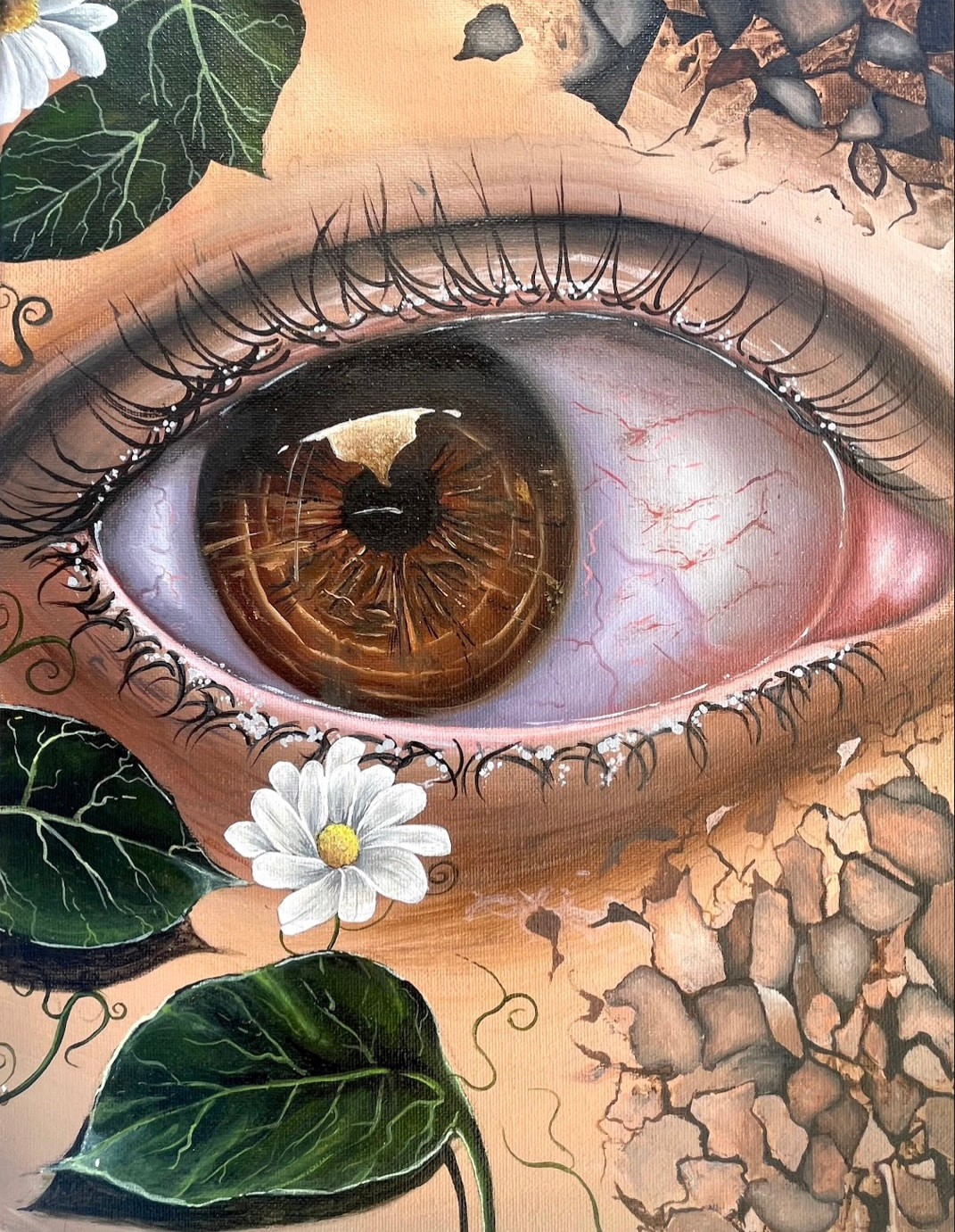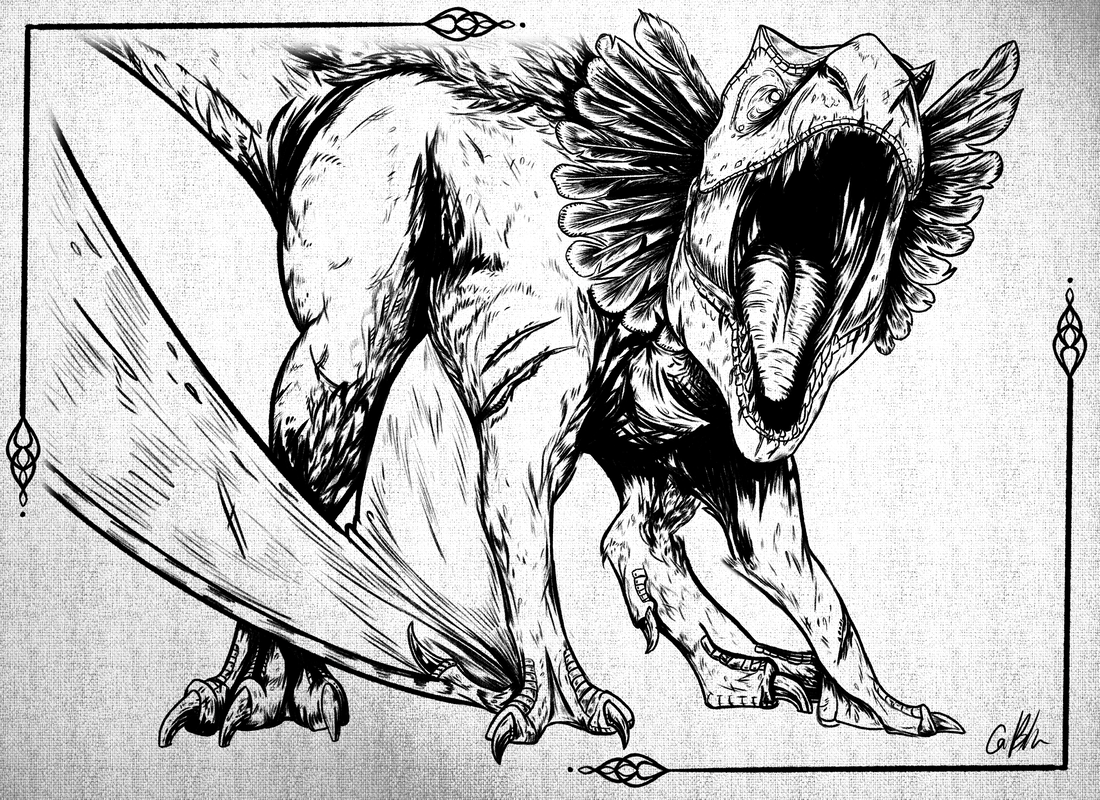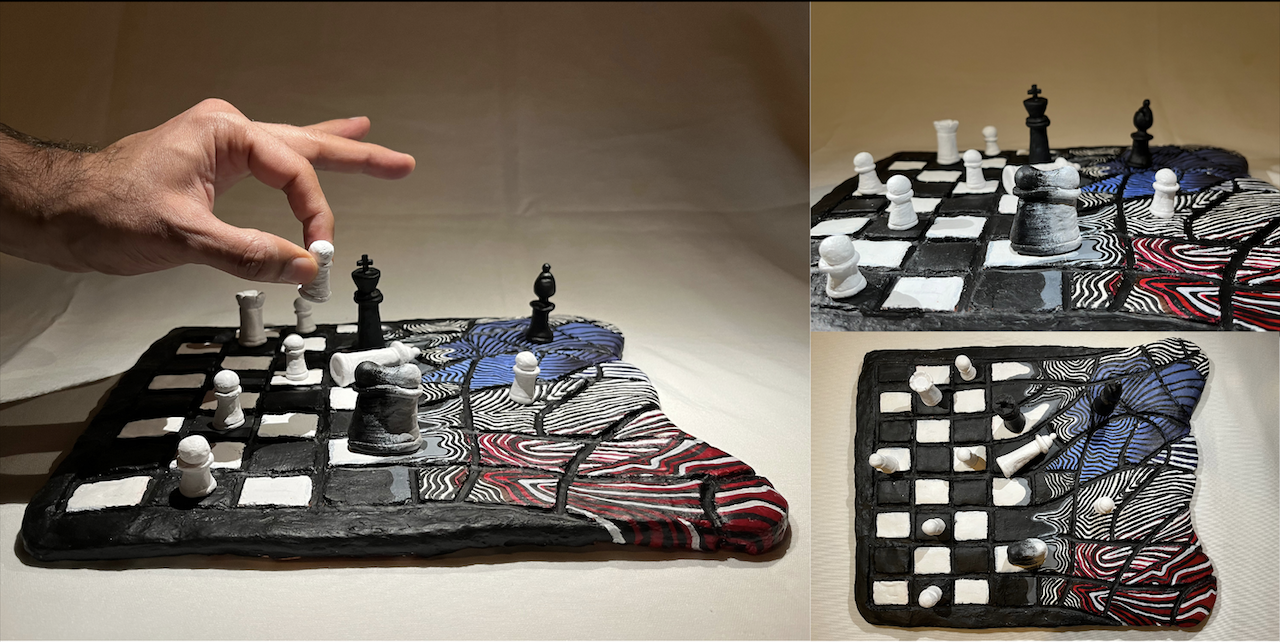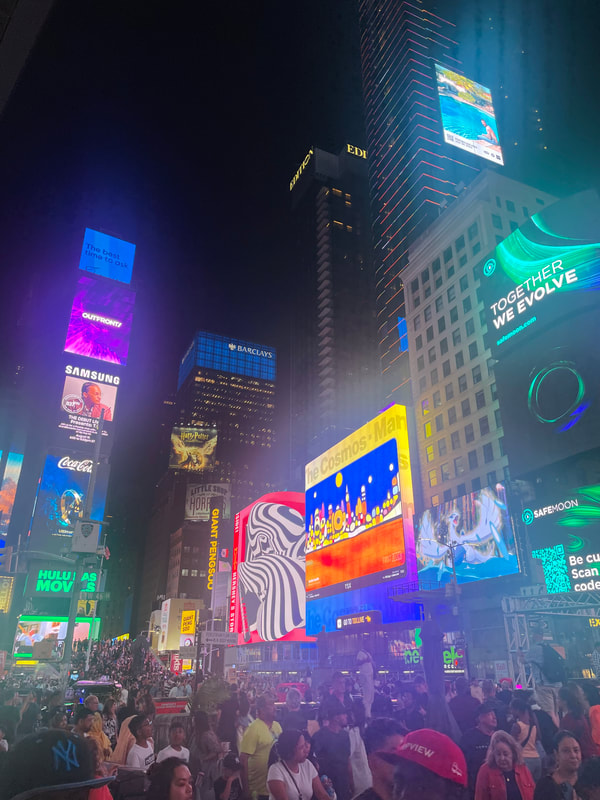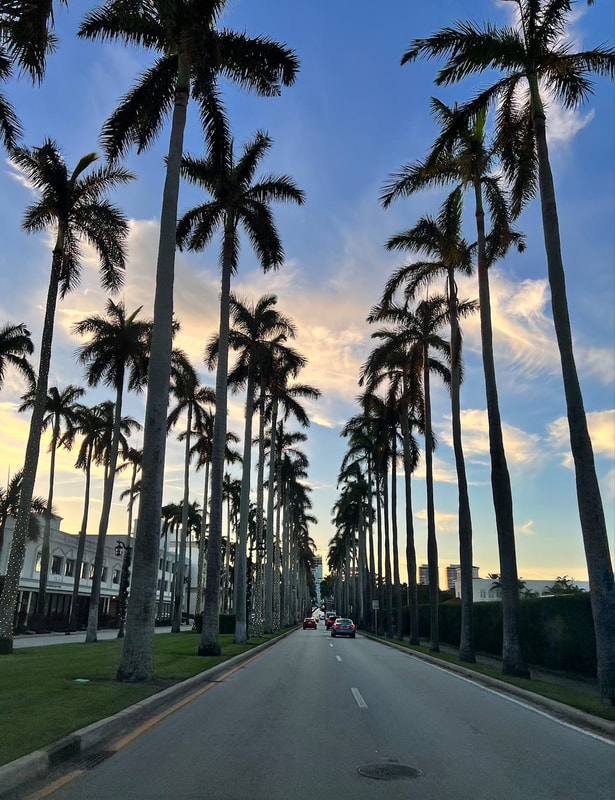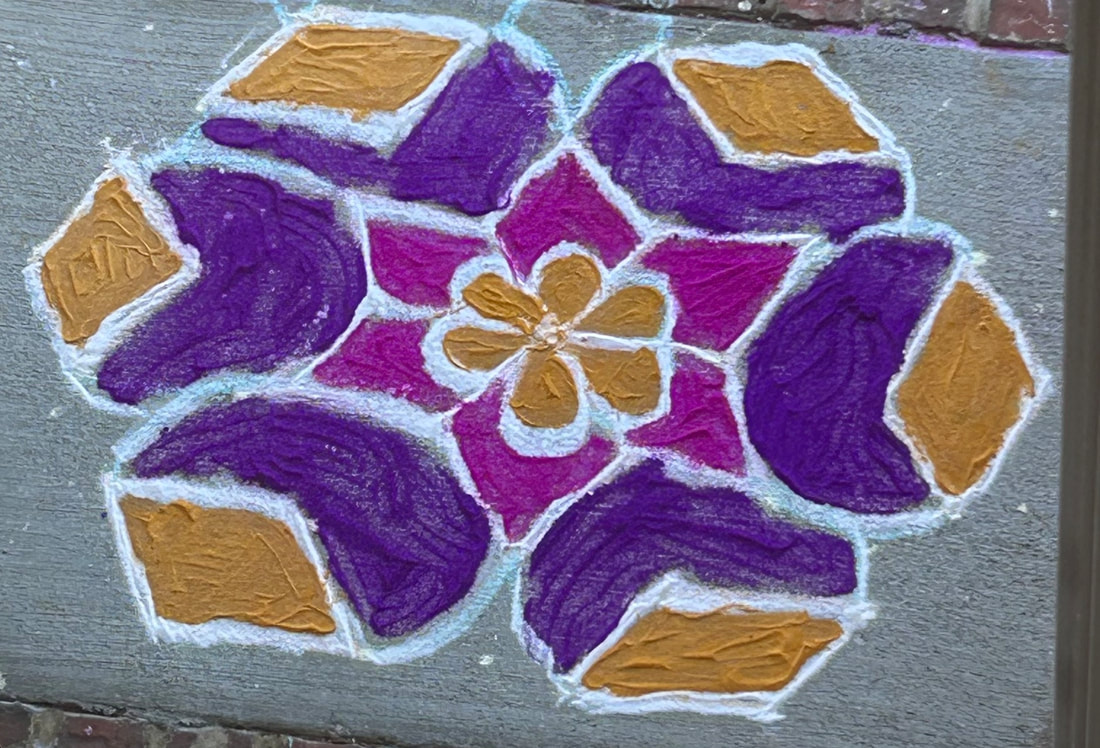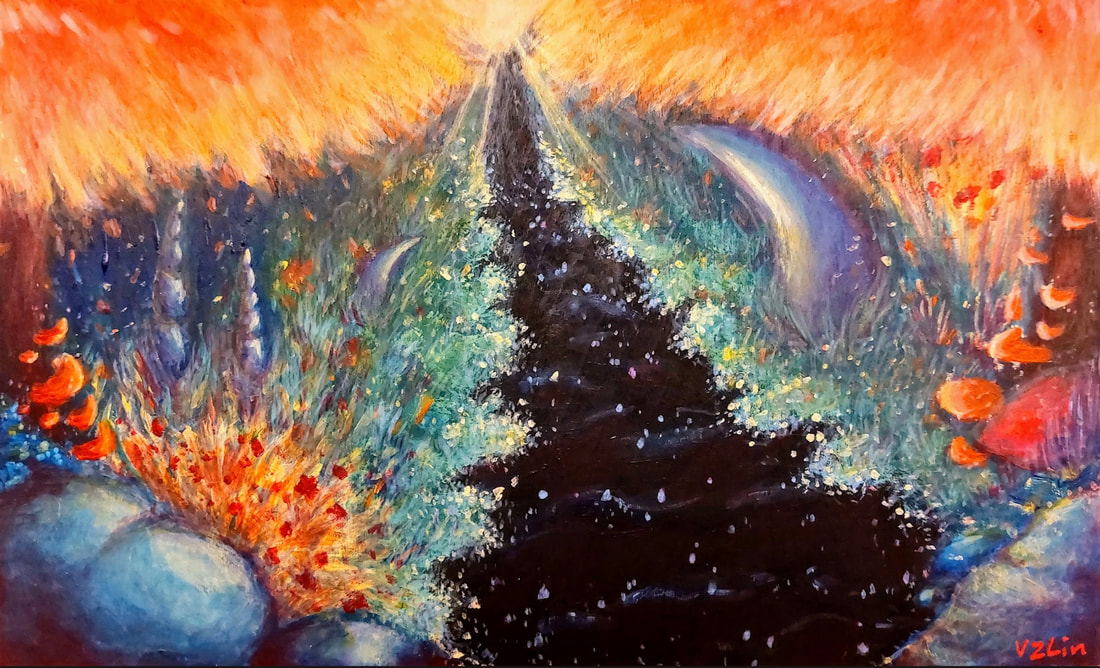Table of Contents
Poetry + Prose
December Forest, Neeshal Gupta
A White Blanket, Riva Patel
Lucy’s Apparatus, Ella Lin
Last Moments, Neeshal Gupta
Overcoming Xenophobia in America, Panshul Aeron
The escape, Leonie Justis
A White Blanket, Riva Patel
Lucy’s Apparatus, Ella Lin
Last Moments, Neeshal Gupta
Overcoming Xenophobia in America, Panshul Aeron
The escape, Leonie Justis
Art
|
Aphrodite, Vivian Lin
A Blazing Crimson Sky, Laya Nair Choti Rangoli, Laya Nair City Of Imaginations, Sindu Rachakonda Crochet My Melody, Cassie Barello Drown, Sindu Rachakonda Evil Eye, Shreeya Joshi Florida Beaches, Brianna Hong Flying in a Dream, Pearl Lin freeway sunset, Riva Patel Home Of The Gators, Brianna Hong Jungle Monkey, Cassie Barello Mushroom Snake, Vivian Lin Nature's Plight is Ours To Bear, Aditya Bharti nyc at night, Jaya Nadella Open Sky, Sanya Padmaperuma Pink Flower, Caroline Chen |
Player's POV, Shreeya Joshi
Pterannosaur, Catherine Bloomfield Sea of Light, Brianna Hong serenity. Fariha Kamrul Sewn to Me, Known to Me, Anaís Lopez-de Jesus Skull, Sindu Rachakonda Smoke & Mirrors, Shreeya Joshi Solar Eclipse!, Alexa Crawford Spring Crochet Duck, Cassie Barello Summer Days, Rebecca Zhang The Dagger, Vivian Lin The Forbidden Fruit, Vivian Lin The Stranger, Vivian Lin Untitled, Anaís Lopez-de Jesus Untitled, Anaís Lopez-de Jesus Waiting is a Broken Feeling, Riya Selvarathnam Waves in the Clouds, Charlize Andrews |
|
Aphrodite, Vivian Lin
|
December Forest
|
A White Blanket
|
Sewn to Me, Known to Me, Anais Lopez-de Jesus
Whispers of the Night
|
|
Last Moments
|
|
The escape
Leonie Justis
At first It was Slaying a dragon,
Then It was Solving a crime,
And I Imagined all sorts of Things,
A Escape that I desperately needed,
When you started to read,
You read about Heros and Villians,
The Hero Saving the City by slaying the Villain,
Good Vs. Evil,
But now we scroll on Social Media,
Or Play video games shooting other people,
Fantasy is a Escape that everyone Needs,
Yet now there is a new Escape that people use,
So your Imagination Slithers away,
Into a hole where it isn't used,
Scared into it by Phones, school and computer,
So pick up a book or dream a little,
Let your Inner child live.
Then It was Solving a crime,
And I Imagined all sorts of Things,
A Escape that I desperately needed,
When you started to read,
You read about Heros and Villians,
The Hero Saving the City by slaying the Villain,
Good Vs. Evil,
But now we scroll on Social Media,
Or Play video games shooting other people,
Fantasy is a Escape that everyone Needs,
Yet now there is a new Escape that people use,
So your Imagination Slithers away,
Into a hole where it isn't used,
Scared into it by Phones, school and computer,
So pick up a book or dream a little,
Let your Inner child live.
Lucy's Apparatus
Ella Lin
The City of Light has always been caressed by the sun, constantly bathed in its gentle rays, and never touched by cold or
plague. When asked why this city, alone, is able to avoid the desolate winters and devastating illnesses that occasionally plague
the rest of the nation, the townspeople will have a simple answer: “It’s because we have been blessed by God.” The legend goes
that of all the cities, towns, and villages in the world, God chooses to keep his eye on the City of Light. It’s easy to tell why; the city
is all elegant metallic spires and sheer white ribbons tracing the paths of each street, glowing with an otherworldly radiance
under the tender daylight. Many-a-traveler have remarked that walking into the city is much akin to getting a glimpse of heaven:
a blanketing airiness seeming to whisk away their worries, as musical laughter and shining constructions bring back the
long-forgotten joy of childhood; warm honey coating their tongues and an inexplicable laughter bubbling in their hearts as they
are brought to a state of pure innocence. The City of Light was heaven on earth, and as such, found itself to be filled with angels.
That is, the best and brightest humanity had to offer.
After extensive scrutiny by the city’s counsel, it was determined that only the following kinds of people were allowed to
take permanent residence within the city: master craftsmen, famed musicians, prodigious actors, geniuses, the most brilliant of
inventors, and anyone else who has demonstrated unparalleled superiority in their chosen field. In short, living in the City of
Light was a greatly exclusive right allowed only to the most incredible of people, and so its residents were, justifiably, very proud
of themselves.
But to be proud didn’t mean that they were conceited. Quite the opposite, actually. The people of the city were as
beautiful in character as they were skilled, filled with friendly and encouraging words for whoever would approach them, making
the city’s social scene somewhere utterly enrapturing to non-natives. One such person who’d become taken with this profoundly
agreeable kind of conversation was Lucy Talworth, a designer who fell in love with the city after an evening spent sitting in its
artisanal bakeries and dancing to its rapturous music. She wished to move onto its glimmering streets, have her own place
amongst its charming houses and inviting people, but she was no master, prodigy, or genius in her craft. Above-average, yes, but
not exceptional in the way required of her to win residence. Instead, she’d found her way into the city’s thralls by marrying one
Thomas Marchiner, a gifted inventor who specialized in machines, who’d become utterly captivated by her after an evening
together in his workshop. And so Lucy Marchiner won her way into the city’s social scene, and delighted in her dialogue with the
other city-women, crafting for herself a precious reputation as a wise and generous woman who would extend a hand to all.
However, as the years passed and the people grew, Lucy found that the turn of conversation had gone somewhere she couldn’t
follow: motherhood.
“My son is at that age, you know, when he goes around biting everything in sight. Oh, by the lord, I should hope my
husband is mindful enough to keep him away from anything toxic while I’m out.”
“Oh, I understand that, truly. My daughter was similarly interested in having a taste of anything that so much as moved
in her sight! Why, the day I caught her about to eat a lizard, oh!”
“Do tell more, do tell more.”
As discussions like this became the norm amongst the ladies, Lucy found herself left behind in their discussions, seeing
as she had no child of her own to share such anecdotes about.
“Dear Thomas,” she cried, “why can we not have a child?”
“You’ve heard the doctor, love. There’s nothing that can be done. I know you want a little one for our home, and I would
be lying to say I wasn’t keen for one myself, but it’s just not possible.”
“But are you not a genius, dear? Are you not a prodigy? Dear Thomas, haven’t you enough extraordinary in you to be a
well-and-true person of light? For us, my dear, my love, can you not make a miracle?” Faced with the desperate pleas of his
beloved wife, Thomas allowed his thoughts to tread to somewhere he’d long marked-off as harebrained. And when he let out a
small sigh carrying, a tenuous “Well...”; when Lucy’s eyes brightened at hearing his proposal, the couple’s fate was well and truly
sealed. They would have a child, whatever the cost. Even if that child couldn’t be human.
It was an immaculately sunny day, as it always was in the city, when Andy opened their eyes for the first time. Propped
against the workbench of Thomas’s private workroom, the child-sized automaton blinked into existence with the whir of a finely
condensed motor and a few arcs of electricity. To the delight of both their creators, Andy’s first word was a sweet and polite
“Hello.”
The first couple weeks of their existence were spent in the back of the Marchiner’s home, where a child’s playroom had
been carefully appended at the end of the hallway, and where they received many lessons from Lucy on etiquette, common
knowledge, and the emotional expressions expected of them as a proper child. “It may be difficult to understand,” Lucy would tell
them, “but I believe you can do it. You can be as lovely a child as any human could. My miracle child.” It was to Lucy’s immense
delight to learn that Andy was a quick study, needing only days to master advanced subjects like calculus and philosophy. By
three months after their so-called “birth”, Lucy was ready to introduce Andy to the city.
“My child,” she said, with an affectionate hand laid on their shoulder as she smiled at her friends. “Andy. Thomas’s
creation. With them, our family is complete.”
Lucy’s expression was one of pride, delight obvious in how she held her child. As such, Andy made sure to tune their
expression to be similarly joyous: smile stretched to fit cleanly across their face, edges tilted unevenly to give the impression of
sincerity, pushing their cheeks into plump rounds to enhance their youthful image, and head dipping at a slight angle for the
impression of bashfulness. They would’ve made a stunning image, the two of them. A beautiful new mother in the throes of
elation, and her endearing young child with shining eyes and glowing skin, smiling so sincerely. Yes, they would’ve been a
beautiful picture, were it not for the metallic sheen across the child’s body suggesting they wouldn’t bleed when cut, the bolts of
their joints raising bumps from under their neatly-ironed clothes, and the faint glow in the back of their irises, indicative of the
camera lenses they used to see. All these things spoke of how the child was not human, and that shook the hearts of the woman,
rendering whatever fondness they would’ve felt into a cold, searing fear.
For you see, while the City of Light enjoys the favor of God, those benefits don’t come without a cost. To have a paradise
tailored to humankind, the caveat is that such a paradise can house only humans. There are no trees, no grasses, no flowers or
fields able to grow in the city. Similarly, any livestock that comes into the city quickly falls into stasis. They don’t die, no, but are
petrified until some traveler will take it upon themselves to escort their prone forms back out the city gates, at which point they
will be released from the spell. But even such a curse cannot detract from the splendor of the city, as the issue of food is easily
circumvented by the importation of crops and meats from neighboring villages, who are all too eager to offer their goods to the
illustrious city.
It’d forever been believed the only beings that would ever walk the city’s streets, would ever breathe its air and speak
with its people, would be humans. That was the ordination of God, His special design for the blessed city. But the existence of this
child, this miraculous marvel of mechanical construction, who was very distinctly not human, but could avoid the curse of
freezing, disturbed this established order. To the people of the city, who always abided by the commandments of God, who
faithfully attended all the church’s sermons, and who largely considered His benevolence the key to their success, the child whose
very existence defied His ordinance could only provoke divine retribution.
As such, Lucy’s cheerful announcement was met with looks of apprehension, nervous glances shared between the
friends she’d gathered, and a tentative “Madam, may we speak?” directed at her as all their postures tensed. Away from the child,
who Lucy had led back to the house upon seeing the other womens’ discomfort, her friends had leveled many questions with her.
Variations of “how does that child exist?”, “what compelled you to such a daring venture?”, and “is your home still safe?” were
among the most common, while a few queries that rang closer to “what is that child like?” and “do they make you happy?”
occasionally appeared amidst the chatter.
Their conversation drew until sunset, as Lucy did her best to assuage the fears of her friends. “Andy was the product of
mine and Thomas’s love, same as any other child. We always felt our home was missing without a little one running around, Andy
completed us. Andy is such a good child, so kind and obedient, they don’t have a mean wire in their armature.” After long and
deliberative discussion, the women finally agreed to set aside their weariness towards Andy, and so Lucy set to arranging their
social affairs.
The first function Lucy took Andy to was a dinner party between the city’s academically-inclined families, hosted by the
chief mathematics professor. “You’ve finished your classes on networking,” she’d told them before the front door, brushing down
the shoulders of their fitted coat, “Put them to use. I believe in you, darling.” Then she’d sauntered away, entering the party with a
practiced ease, as Andy stood outside for another ten minutes reviewing their notes before finally following after. As they moved
about the house, introducing themself to the other children present, they repeated their lessons like mantras. Always bow when
greeting someone new. Show deference even when you rank higher than your conversation partner. Nod along with whatever
they say, interjecting with simple questions every now-and-then to show you’re listening; complex enough to show
comprehension of the subject, but not so Byzantine that your partner would become frustrated finding the answer. Maintain eye
contact. Keep your posture straight. Hands behind your back. Don’t fidget. Use a light voice. Remember to blink, once every four
seconds should do. While it would be advisable to smile, yours still needs improvement, so keep a cool demeanor instead. That
smile... we’ll work on it at a later date.
And so Andy wandered, chatted, and “networked” with their fellows for the duration of the night. The chemist’s son,
second-librarian’s daughter, architect’s son, and most children under the age of nine seemed to enjoy their company— either
marveling at their structure, preening in their attention, or enthralled by their extensive catalog of miscellaneous facts. While
the older children, brought up on the same sermons shared across the city, showed more hesitance mingling with them, no one
actively pushed away their presence, too courteous to cast judgment when their mothers had already shown an unsaid
acceptance towards them. Andy could tell that everyone wanted to ask the hows and whys of their existence, most of them
unable to stop the curious glances wherever they passed, but Lucy had said “Pay no mind, I will handle their questions of you,” so
they let it be, regardless of how it burned. At the end of the night, reunited with their mother, Lucy bade them a gentle nod and
small, satisfied smile; having kept up on their ventures throughout the night, and approving of their success.
“Next,” she said as she tucked their hand in hers, leading their pair back home, “we’ll fettle your reputation.”
Andy learns to tutor, getting drilled in the ins-and-outs of instruction from Lucy over three days, before being
volunteered to hold the next geography study session for the city’s ten year olds. “You were made to resemble someone closer to
the ages of five and seven than nine and ten,” Lucy had told them while setting the table, “So your advanced knowledge in these
subjects should win you respect among the older children.”
She’d nodded to herself at that statement, then stilling for a second, two, before her lips cracked a thin smile. “They
might even call you a prodigy.”
It took a month of assorted tutoring, Lucy facilitating contact between them and upcoming practitioners of all
disciplines under the sun, but the people did, eventually, end up calling Andy a prodigy; alongside the titles of genius, whiz,
wunderkind, mastered study, and, Lucy’s favorite, the model of Light. Now when the people saw Andy passing by, they would
smile and wave the automaton over with a comfortable ease, eager to open conversation with the famed maven, and share in
their wisdom. It seems the unveiling of their wit had diminished the trepidation brought on by their being, as no resident of the
city could bear to deny the company of someone so seasoned in their beloved domains. It wasn’t long before Andy’s very presence
became a popular commodity among the city, as many wished to confer with someone as cultured in their favored fields as they
themselves were. With these developments, too, came an uptick in the number of people who’d approach Lucy on the street,
asking after Andy’s location, and showering her in praise for raising such an erudite child.
“You see, Andy, you’ve even got the mayor’s eye on you now!” Lucy delighted with herself as she tucked Andy into bed.
It’d become a nightly routine, of sorts, for mother and child to sit together by the candlelight, one sat primly in her rocking chair
while the other was snug under the covers, sharing the contents of their day before letting the fire go out. When not engaged in
any discussion or debate, Andy found themself to be a rather quiet child, so their accounts read rather succinctly as reports of
who they’d talked to and not much else. Lucy never seemed to mind this, always quick to fill in the silence with her own
narration, what chores she’d done, who’d approached her that day, what questions they had about Andy, and what lessons she’d
planned for the coming days.
In these musings, it wasn’t uncommon for Lucy to say, “Tomorrow, we’ll work on that smile.” Because while Andy had
won the welcome of the city, they still hadn’t mastered the most basic component of socialization: facial expressions. When
speaking with others, Andy would always keep their face at a neutral impassiveness. While this often gave the impression that
they were a cool and composed child, Lucy feared as they “grew up” from Thomas’s bi-annual adjustments, done to mimic a
proper child’s development, their forever-stoic face would begin to seem callous and detached on an older model. As such, she
took an increasing interest in refining Andy’s countenance as the time passed, changing monthly lessons on their fizzog to
weekly ones, then bi-weekly ones, then daily ones. And as Andy aged and studied all they could, soon those lessons were the only
ones ever left on their agenda.
“Turn your upper lip up slightly while maintaining a flat horizontal distance just above the upper teeth. Curve your
lower lip to a symmetrical arc which hides the bottom half of your lower teeth from sight. Make sure only the teeth are visible, no
gums. The corners of your mouth should be in line with each other, don’t let either side droop. Try deepening the angle of the
lower arc. No... try lightening it. Let the upper lip drop some. Press both lips together, not so hard as to lour, just enough to close.
Raise the corners more. No, let them fall. No, part your lips a sliver. No, raise them fully. No, stretch the ends out further, pull it
wider across your face. No, cover the gums. No, bring the corners back in. No, raise the corners up, bend your eyes up some, too.
No. No. No, no, no! Nothing’s working!” Lucy screamed, unable to stop herself from jumping out of her seat. Hands wrestling with
her hair, she paced around the room, murmuring unintelligibly to herself, for a minute, two, before finally turning to Andy, who’d
by then returned their face to its standard indifference.
“Apologies, darling,” she’d say, ”It seems I still can’t figure it out. We’ll try again tomorrow.”
After that, they’d be dismissed, and the two would part ways for the remainder of the day. This cycle ran for weeks, Andy
practicing every conceivable arrangement of tilted oral commissures and rounded slope of their lip pieces, and Lucy never able to
pinpoint what, exactly, was wrong. Until one day, when the weather was just a tad below its typical warmth, the sun still high in
the sky, and all facets of city-life otherwise unaltered from its usual customs, Lucy faced Andy’s still-defective smile, and struck
out a whispering gasp.
“Oh,” she trembled. “You have no soul.”
And that was that.
Lucy never called them in for smiling lessons again. Nor did she ever mention the hours they’d spent together practicing
the expression. Nor did she ask about their individual practice, nor their progress in making those visages look intuitive, nor
their observations on the smiles of others, nor their own theories on what was distorting their smile. The matter was entirely
dropped, Lucy herself resigned to Andy forever having a solemn face, and expecting Andy to follow suit. But, somehow, Andy
couldn’t erase the matter from their mind. No soul, she’d said, no soul means no smile. But how does a soul relate to a smile? But
how can she say they don’t have a soul? But how can there be no hope for them without a soul? But how can she give up on them,
how can she turn her back on their efforts so simply? But how, but how?
In the sudden absence of Lucy’s lesson, Andy had taken to spending time in the workshop with Thomas. Andy and
Thomas weren’t close in the same way they both were with Lucy. They lived in the same house, ate the same food, yet hardly
knew a thing about each other. As it turned out, there wasn’t much for each of them to learn about the other, for they were both
much the same. Both quiet and studious, content to work on their own projects in companionable silence, speaking only when in
need of advice or a secondary opinion. There was an unstated understanding between the two, as similar as they were, which
allowed them to exist in mutually contented ambiance which lended well to long hours in each others’ company. It was a rather
pleasant surprise for Lucy to find; that the two members of her family had become so easily comfortable with each other.
“Dear Thomas,” she’d teased, “it seems you’ve duplicated yourself. Should I take it up with the other wives, that you’ve
turned our child into your mirror? There’s no question who Andy takes after, but someday, someone may ask if there was ever a
second person involved in their creation; if you’ve just made them in your own likeness.”
“My love,” her husband would leak a small smile back, “it was not my intention for our child to be so alike myself. But if it
means Andy would love you as fervently as I do, I’m afraid I cannot find much to consider in your complaint.”
Andy’s integration into the daily comings-and-goings of the workshop had, in some imperceptible way, filled in the gaps
that’d been unnoticed by the family. The automaton felt more connected to the people who raised it than they ever had before,
and thus became marginally more inclined to voice their own questions. Never with Lucy, no, she didn’t deserve to be
preoccupied with their menial incertitudes; but to Thomas, who was always willing to play a mollifying ear.
It started with inane, thoughtless inquiries like “why is the weather always warm?” and “what is the texture of a leaf?”
But, in time, Andy became comfortable enough to voice the one question that’d been ruminating in their mind since that day:
“What is a soul?”
And Thomas, plainly as ever, had responded: “A soul is what holds the thoughts and feelings of people. It understands the
needs, wants, and desires of its owner more than they could understand themselves, and as such, pushes their bodies and wills to
act in the interest of their values. By compulsion of the soul, people are able to perform extraordinary feats of strength, move on
impulse, and experience an overwhelming depth of emotion that can translate into their work. It’s said that God himself gave a
fragment of His own soul to all the people under His dominion, so His favored children would be able to perceive the world as He
could, in ebullient spectacularity. He wished this greater sensitivity would elevate what the people could produce, so that art and
invention could flourish among the lands. Here, in the City of Light, at the heart of it, the people receive these blessings stronger
than anywhere else; raising our creations with an unparalleled ardor which radiates to all.”
“How do you know if you have a soul?”
“Well, all people have a soul, Andy. If they see the sun, taste the air, care for their fellows, and feel love for their cherished
ones, they have a soul. Their soul tells it to their hearts, to brew the fondness, and passion, and tender affection that wells up
when those they hold dear are near.”
“So... the soul fuels the smile?”
“In a way, yes. The soul imbues a smile with the feelings of joy and warmth that spawned it, relaying those sentiments to
the receiver.”
“Do I have a soul?”
“Of course you do. You’re God’s special exception in his closest land, the only nonhuman being that can live amongst
people, just like one of them. Just like us, you have a soul.”
“Lucy says I don’t.”
At that, Thomas stopped; hands still in Andy’s open chest cavity where he’d been running repairs on their vocal module.
He didn’t have to speak for them to recognize the retraction. If Lucy said it...
“Hm...” Thomas gave an apologetic hum, and softly returned to his work. That was that.
Andy had no soul, so they had no feelings, so their “heart” was useless, so they couldn't be human, no matter how much
they’d want to be. No matter how much Lucy wanted them to be. No matter how much time, effort, and love the Marchiners put
into raising them, they couldn't return it. Because they didn't have emotions. Because they didn't have a human’s heart.
But... if they did have a human heart... if they could feel those vivid emotions...
Every human has a heart, but seldom few would volunteer their own to the hands of another. The heart is a precious
thing, from what Andy understands. Although it’s just a fist-sized bundle of tissues in the cardiovascular system, interlocking
lamina forming chambers and pumps from organic material, the human heart is hailed for some intangible, spiritual quality of
empyrean origin which grants it singular jurisdiction over all sentiments. As such, no one in their right mind would be willing to
give such a treasure away to any old inquisitor. No; if Andy wanted to study a human’s heart, they’d have to obtain one from
someone close to them, someone who wouldn’t mind such a sacrifice, if it’d be for their benefit. Someone like Lucy, kind and
gracious Lucy, who’d always sacrificed her time, energy, and patience planning lessons, collecting research materials, and playing
consultant for them.
Which is how, less than a week after their fateful conversation with Thomas, Andy found themself edging open the door
to Lucy’s bedroom in the seams of night, positioning a kitchen knife flat atop her throat. Whenever Thomas worked maintenance
on them, he’d send an electric current through their circuitry before opening them up, as their internal mechanisms would be a
projectile risk if not deactivated before their interior pressure was decreased. Their consciousness would be reactivated once
they were safely uncovered, but they wouldn’t be allowed to move until after the procedure was completely finished, so as to
avoid jostling their gears at a detrimental time. Andy figured the same process should be applied when performing surgery on a
human: incapacitate them first, then begin cutting. So with a smooth, quick motion, they drew an inch-deep line across the base
of her neck; watching as her blood began to bead at the edges of the incision, and as her eyes shot awake at the sensation. Her
mouth widened, as if to scream, but no sound came out. As her shaking pupils found Andy’s steely optics, her eyes screwed
together, brow wrinkling, nostrils flaring, weakening facial muscles scrounging enough force to tense her lower-jaw.
That expression could be one of sadness, or it could be one of anger. The tightening of her eyes could be perceived as
sorrow, though the scowl she’d adopted would indicate rage. Cognitive empathy was always Andy’s worst subject. For their own
sake, Andy would like to believe it was mere disappointment. They forgot to ask permission, after all. A terrible transgression
given all their lessons on propriety.
Perhaps with another hour, two, to analyze that expression Andy may’ve been able to discern exactly what Lucy’s face
portrayed. But alas, that frail, mutable moment which existed between them slid away in a matter of seconds; as the light drained
from Lucy’s eyes, and all her taut skin and bulging veins slumped down against her skull like melting candle wax. Andy couldn’t
help but mourn it, that every hour they’d spent with her culminated in such a fleeting instance, that all they’d learned together
condensed and compounded into a flickering juncture captured in a passing blink. Still, there was no time to dally. The emotion
they should’ve felt, in that singular instance of profound loss, was quickly pushed away by the being that’d never experienced any
emotion before, who’d never felt the need for sentiment besides as a communicative skill.
With the precision of a seasoned surgeon, and the certainty of someone who’d studied anatomical diagrams before they
could even walk, Andy moved the knife to slice three long lacerations in the shape of an “I” down the center of her chest. Using
those fissures, they proceeded to peel each of her pectorals away from her body to reveal her chest cavity; paying no mind to the
blood lathering their hands and they peered inside with a single-minded determination which would surely be admired by any
man. And there, nestled daintily between each of her lung sacks, as promised, was her heart; still shaking with sporadic pulses as
Andy traded their knife to cradle it in both hands, lifting it to the moonlight.
They sought to engrain this scene in their memory above any other. This triumphant moment, when they could finally
boast a heart of their own. The sparking, palpably electric sensation in their circuits as their mind spun with all the ways they
could study this new heart, all the ways they could collect its divine knowledge, all the ways they could assimilate to its
teachings; this feeling they accepted, they tentatively identified as anticipation. They wished to etch every facet of the room, in
that moment, into their very being. The stillness of the air, as if every blessing that’d ever graced the city was caught in the same
enrapturement, aware of that very moment. The incredible silence which wrapped their figures, elevating the stage into another
realm of serenity. The stars that shone brilliantly, as always, from beyond the room’s narrow window, their svelte glares bolstered
in delivery by the exceptional radiance of the moon. The heat of the night which rested on their shoulders, embraced their form, a
beatific shawl to complete the scene.
The winter night, which was always unnaturally warm in the City of Light, was sweltering.
Surely, this was attestation of God’s gaze. His blessing.
The moment was broken, rather abruptly, by a thud against the door. Turning in a level arc, so as to avoid jolting the
treasure kept secure in their grasp, Andy met the ever-somber face of Thomas; who looked somehow even more dismal than
usual. Lucy was correct in saying they were impossibly alike. As she always was.
It took no more than a glance at Lucy’s prone, chilling form as it was left on the bed to impel Thomas to speak.
As always, he kept it simple:
“Kill me next.”
Andy shifted the heart to one hand, and picked up the knife.
plague. When asked why this city, alone, is able to avoid the desolate winters and devastating illnesses that occasionally plague
the rest of the nation, the townspeople will have a simple answer: “It’s because we have been blessed by God.” The legend goes
that of all the cities, towns, and villages in the world, God chooses to keep his eye on the City of Light. It’s easy to tell why; the city
is all elegant metallic spires and sheer white ribbons tracing the paths of each street, glowing with an otherworldly radiance
under the tender daylight. Many-a-traveler have remarked that walking into the city is much akin to getting a glimpse of heaven:
a blanketing airiness seeming to whisk away their worries, as musical laughter and shining constructions bring back the
long-forgotten joy of childhood; warm honey coating their tongues and an inexplicable laughter bubbling in their hearts as they
are brought to a state of pure innocence. The City of Light was heaven on earth, and as such, found itself to be filled with angels.
That is, the best and brightest humanity had to offer.
After extensive scrutiny by the city’s counsel, it was determined that only the following kinds of people were allowed to
take permanent residence within the city: master craftsmen, famed musicians, prodigious actors, geniuses, the most brilliant of
inventors, and anyone else who has demonstrated unparalleled superiority in their chosen field. In short, living in the City of
Light was a greatly exclusive right allowed only to the most incredible of people, and so its residents were, justifiably, very proud
of themselves.
But to be proud didn’t mean that they were conceited. Quite the opposite, actually. The people of the city were as
beautiful in character as they were skilled, filled with friendly and encouraging words for whoever would approach them, making
the city’s social scene somewhere utterly enrapturing to non-natives. One such person who’d become taken with this profoundly
agreeable kind of conversation was Lucy Talworth, a designer who fell in love with the city after an evening spent sitting in its
artisanal bakeries and dancing to its rapturous music. She wished to move onto its glimmering streets, have her own place
amongst its charming houses and inviting people, but she was no master, prodigy, or genius in her craft. Above-average, yes, but
not exceptional in the way required of her to win residence. Instead, she’d found her way into the city’s thralls by marrying one
Thomas Marchiner, a gifted inventor who specialized in machines, who’d become utterly captivated by her after an evening
together in his workshop. And so Lucy Marchiner won her way into the city’s social scene, and delighted in her dialogue with the
other city-women, crafting for herself a precious reputation as a wise and generous woman who would extend a hand to all.
However, as the years passed and the people grew, Lucy found that the turn of conversation had gone somewhere she couldn’t
follow: motherhood.
“My son is at that age, you know, when he goes around biting everything in sight. Oh, by the lord, I should hope my
husband is mindful enough to keep him away from anything toxic while I’m out.”
“Oh, I understand that, truly. My daughter was similarly interested in having a taste of anything that so much as moved
in her sight! Why, the day I caught her about to eat a lizard, oh!”
“Do tell more, do tell more.”
As discussions like this became the norm amongst the ladies, Lucy found herself left behind in their discussions, seeing
as she had no child of her own to share such anecdotes about.
“Dear Thomas,” she cried, “why can we not have a child?”
“You’ve heard the doctor, love. There’s nothing that can be done. I know you want a little one for our home, and I would
be lying to say I wasn’t keen for one myself, but it’s just not possible.”
“But are you not a genius, dear? Are you not a prodigy? Dear Thomas, haven’t you enough extraordinary in you to be a
well-and-true person of light? For us, my dear, my love, can you not make a miracle?” Faced with the desperate pleas of his
beloved wife, Thomas allowed his thoughts to tread to somewhere he’d long marked-off as harebrained. And when he let out a
small sigh carrying, a tenuous “Well...”; when Lucy’s eyes brightened at hearing his proposal, the couple’s fate was well and truly
sealed. They would have a child, whatever the cost. Even if that child couldn’t be human.
It was an immaculately sunny day, as it always was in the city, when Andy opened their eyes for the first time. Propped
against the workbench of Thomas’s private workroom, the child-sized automaton blinked into existence with the whir of a finely
condensed motor and a few arcs of electricity. To the delight of both their creators, Andy’s first word was a sweet and polite
“Hello.”
The first couple weeks of their existence were spent in the back of the Marchiner’s home, where a child’s playroom had
been carefully appended at the end of the hallway, and where they received many lessons from Lucy on etiquette, common
knowledge, and the emotional expressions expected of them as a proper child. “It may be difficult to understand,” Lucy would tell
them, “but I believe you can do it. You can be as lovely a child as any human could. My miracle child.” It was to Lucy’s immense
delight to learn that Andy was a quick study, needing only days to master advanced subjects like calculus and philosophy. By
three months after their so-called “birth”, Lucy was ready to introduce Andy to the city.
“My child,” she said, with an affectionate hand laid on their shoulder as she smiled at her friends. “Andy. Thomas’s
creation. With them, our family is complete.”
Lucy’s expression was one of pride, delight obvious in how she held her child. As such, Andy made sure to tune their
expression to be similarly joyous: smile stretched to fit cleanly across their face, edges tilted unevenly to give the impression of
sincerity, pushing their cheeks into plump rounds to enhance their youthful image, and head dipping at a slight angle for the
impression of bashfulness. They would’ve made a stunning image, the two of them. A beautiful new mother in the throes of
elation, and her endearing young child with shining eyes and glowing skin, smiling so sincerely. Yes, they would’ve been a
beautiful picture, were it not for the metallic sheen across the child’s body suggesting they wouldn’t bleed when cut, the bolts of
their joints raising bumps from under their neatly-ironed clothes, and the faint glow in the back of their irises, indicative of the
camera lenses they used to see. All these things spoke of how the child was not human, and that shook the hearts of the woman,
rendering whatever fondness they would’ve felt into a cold, searing fear.
For you see, while the City of Light enjoys the favor of God, those benefits don’t come without a cost. To have a paradise
tailored to humankind, the caveat is that such a paradise can house only humans. There are no trees, no grasses, no flowers or
fields able to grow in the city. Similarly, any livestock that comes into the city quickly falls into stasis. They don’t die, no, but are
petrified until some traveler will take it upon themselves to escort their prone forms back out the city gates, at which point they
will be released from the spell. But even such a curse cannot detract from the splendor of the city, as the issue of food is easily
circumvented by the importation of crops and meats from neighboring villages, who are all too eager to offer their goods to the
illustrious city.
It’d forever been believed the only beings that would ever walk the city’s streets, would ever breathe its air and speak
with its people, would be humans. That was the ordination of God, His special design for the blessed city. But the existence of this
child, this miraculous marvel of mechanical construction, who was very distinctly not human, but could avoid the curse of
freezing, disturbed this established order. To the people of the city, who always abided by the commandments of God, who
faithfully attended all the church’s sermons, and who largely considered His benevolence the key to their success, the child whose
very existence defied His ordinance could only provoke divine retribution.
As such, Lucy’s cheerful announcement was met with looks of apprehension, nervous glances shared between the
friends she’d gathered, and a tentative “Madam, may we speak?” directed at her as all their postures tensed. Away from the child,
who Lucy had led back to the house upon seeing the other womens’ discomfort, her friends had leveled many questions with her.
Variations of “how does that child exist?”, “what compelled you to such a daring venture?”, and “is your home still safe?” were
among the most common, while a few queries that rang closer to “what is that child like?” and “do they make you happy?”
occasionally appeared amidst the chatter.
Their conversation drew until sunset, as Lucy did her best to assuage the fears of her friends. “Andy was the product of
mine and Thomas’s love, same as any other child. We always felt our home was missing without a little one running around, Andy
completed us. Andy is such a good child, so kind and obedient, they don’t have a mean wire in their armature.” After long and
deliberative discussion, the women finally agreed to set aside their weariness towards Andy, and so Lucy set to arranging their
social affairs.
The first function Lucy took Andy to was a dinner party between the city’s academically-inclined families, hosted by the
chief mathematics professor. “You’ve finished your classes on networking,” she’d told them before the front door, brushing down
the shoulders of their fitted coat, “Put them to use. I believe in you, darling.” Then she’d sauntered away, entering the party with a
practiced ease, as Andy stood outside for another ten minutes reviewing their notes before finally following after. As they moved
about the house, introducing themself to the other children present, they repeated their lessons like mantras. Always bow when
greeting someone new. Show deference even when you rank higher than your conversation partner. Nod along with whatever
they say, interjecting with simple questions every now-and-then to show you’re listening; complex enough to show
comprehension of the subject, but not so Byzantine that your partner would become frustrated finding the answer. Maintain eye
contact. Keep your posture straight. Hands behind your back. Don’t fidget. Use a light voice. Remember to blink, once every four
seconds should do. While it would be advisable to smile, yours still needs improvement, so keep a cool demeanor instead. That
smile... we’ll work on it at a later date.
And so Andy wandered, chatted, and “networked” with their fellows for the duration of the night. The chemist’s son,
second-librarian’s daughter, architect’s son, and most children under the age of nine seemed to enjoy their company— either
marveling at their structure, preening in their attention, or enthralled by their extensive catalog of miscellaneous facts. While
the older children, brought up on the same sermons shared across the city, showed more hesitance mingling with them, no one
actively pushed away their presence, too courteous to cast judgment when their mothers had already shown an unsaid
acceptance towards them. Andy could tell that everyone wanted to ask the hows and whys of their existence, most of them
unable to stop the curious glances wherever they passed, but Lucy had said “Pay no mind, I will handle their questions of you,” so
they let it be, regardless of how it burned. At the end of the night, reunited with their mother, Lucy bade them a gentle nod and
small, satisfied smile; having kept up on their ventures throughout the night, and approving of their success.
“Next,” she said as she tucked their hand in hers, leading their pair back home, “we’ll fettle your reputation.”
Andy learns to tutor, getting drilled in the ins-and-outs of instruction from Lucy over three days, before being
volunteered to hold the next geography study session for the city’s ten year olds. “You were made to resemble someone closer to
the ages of five and seven than nine and ten,” Lucy had told them while setting the table, “So your advanced knowledge in these
subjects should win you respect among the older children.”
She’d nodded to herself at that statement, then stilling for a second, two, before her lips cracked a thin smile. “They
might even call you a prodigy.”
It took a month of assorted tutoring, Lucy facilitating contact between them and upcoming practitioners of all
disciplines under the sun, but the people did, eventually, end up calling Andy a prodigy; alongside the titles of genius, whiz,
wunderkind, mastered study, and, Lucy’s favorite, the model of Light. Now when the people saw Andy passing by, they would
smile and wave the automaton over with a comfortable ease, eager to open conversation with the famed maven, and share in
their wisdom. It seems the unveiling of their wit had diminished the trepidation brought on by their being, as no resident of the
city could bear to deny the company of someone so seasoned in their beloved domains. It wasn’t long before Andy’s very presence
became a popular commodity among the city, as many wished to confer with someone as cultured in their favored fields as they
themselves were. With these developments, too, came an uptick in the number of people who’d approach Lucy on the street,
asking after Andy’s location, and showering her in praise for raising such an erudite child.
“You see, Andy, you’ve even got the mayor’s eye on you now!” Lucy delighted with herself as she tucked Andy into bed.
It’d become a nightly routine, of sorts, for mother and child to sit together by the candlelight, one sat primly in her rocking chair
while the other was snug under the covers, sharing the contents of their day before letting the fire go out. When not engaged in
any discussion or debate, Andy found themself to be a rather quiet child, so their accounts read rather succinctly as reports of
who they’d talked to and not much else. Lucy never seemed to mind this, always quick to fill in the silence with her own
narration, what chores she’d done, who’d approached her that day, what questions they had about Andy, and what lessons she’d
planned for the coming days.
In these musings, it wasn’t uncommon for Lucy to say, “Tomorrow, we’ll work on that smile.” Because while Andy had
won the welcome of the city, they still hadn’t mastered the most basic component of socialization: facial expressions. When
speaking with others, Andy would always keep their face at a neutral impassiveness. While this often gave the impression that
they were a cool and composed child, Lucy feared as they “grew up” from Thomas’s bi-annual adjustments, done to mimic a
proper child’s development, their forever-stoic face would begin to seem callous and detached on an older model. As such, she
took an increasing interest in refining Andy’s countenance as the time passed, changing monthly lessons on their fizzog to
weekly ones, then bi-weekly ones, then daily ones. And as Andy aged and studied all they could, soon those lessons were the only
ones ever left on their agenda.
“Turn your upper lip up slightly while maintaining a flat horizontal distance just above the upper teeth. Curve your
lower lip to a symmetrical arc which hides the bottom half of your lower teeth from sight. Make sure only the teeth are visible, no
gums. The corners of your mouth should be in line with each other, don’t let either side droop. Try deepening the angle of the
lower arc. No... try lightening it. Let the upper lip drop some. Press both lips together, not so hard as to lour, just enough to close.
Raise the corners more. No, let them fall. No, part your lips a sliver. No, raise them fully. No, stretch the ends out further, pull it
wider across your face. No, cover the gums. No, bring the corners back in. No, raise the corners up, bend your eyes up some, too.
No. No. No, no, no! Nothing’s working!” Lucy screamed, unable to stop herself from jumping out of her seat. Hands wrestling with
her hair, she paced around the room, murmuring unintelligibly to herself, for a minute, two, before finally turning to Andy, who’d
by then returned their face to its standard indifference.
“Apologies, darling,” she’d say, ”It seems I still can’t figure it out. We’ll try again tomorrow.”
After that, they’d be dismissed, and the two would part ways for the remainder of the day. This cycle ran for weeks, Andy
practicing every conceivable arrangement of tilted oral commissures and rounded slope of their lip pieces, and Lucy never able to
pinpoint what, exactly, was wrong. Until one day, when the weather was just a tad below its typical warmth, the sun still high in
the sky, and all facets of city-life otherwise unaltered from its usual customs, Lucy faced Andy’s still-defective smile, and struck
out a whispering gasp.
“Oh,” she trembled. “You have no soul.”
And that was that.
Lucy never called them in for smiling lessons again. Nor did she ever mention the hours they’d spent together practicing
the expression. Nor did she ask about their individual practice, nor their progress in making those visages look intuitive, nor
their observations on the smiles of others, nor their own theories on what was distorting their smile. The matter was entirely
dropped, Lucy herself resigned to Andy forever having a solemn face, and expecting Andy to follow suit. But, somehow, Andy
couldn’t erase the matter from their mind. No soul, she’d said, no soul means no smile. But how does a soul relate to a smile? But
how can she say they don’t have a soul? But how can there be no hope for them without a soul? But how can she give up on them,
how can she turn her back on their efforts so simply? But how, but how?
In the sudden absence of Lucy’s lesson, Andy had taken to spending time in the workshop with Thomas. Andy and
Thomas weren’t close in the same way they both were with Lucy. They lived in the same house, ate the same food, yet hardly
knew a thing about each other. As it turned out, there wasn’t much for each of them to learn about the other, for they were both
much the same. Both quiet and studious, content to work on their own projects in companionable silence, speaking only when in
need of advice or a secondary opinion. There was an unstated understanding between the two, as similar as they were, which
allowed them to exist in mutually contented ambiance which lended well to long hours in each others’ company. It was a rather
pleasant surprise for Lucy to find; that the two members of her family had become so easily comfortable with each other.
“Dear Thomas,” she’d teased, “it seems you’ve duplicated yourself. Should I take it up with the other wives, that you’ve
turned our child into your mirror? There’s no question who Andy takes after, but someday, someone may ask if there was ever a
second person involved in their creation; if you’ve just made them in your own likeness.”
“My love,” her husband would leak a small smile back, “it was not my intention for our child to be so alike myself. But if it
means Andy would love you as fervently as I do, I’m afraid I cannot find much to consider in your complaint.”
Andy’s integration into the daily comings-and-goings of the workshop had, in some imperceptible way, filled in the gaps
that’d been unnoticed by the family. The automaton felt more connected to the people who raised it than they ever had before,
and thus became marginally more inclined to voice their own questions. Never with Lucy, no, she didn’t deserve to be
preoccupied with their menial incertitudes; but to Thomas, who was always willing to play a mollifying ear.
It started with inane, thoughtless inquiries like “why is the weather always warm?” and “what is the texture of a leaf?”
But, in time, Andy became comfortable enough to voice the one question that’d been ruminating in their mind since that day:
“What is a soul?”
And Thomas, plainly as ever, had responded: “A soul is what holds the thoughts and feelings of people. It understands the
needs, wants, and desires of its owner more than they could understand themselves, and as such, pushes their bodies and wills to
act in the interest of their values. By compulsion of the soul, people are able to perform extraordinary feats of strength, move on
impulse, and experience an overwhelming depth of emotion that can translate into their work. It’s said that God himself gave a
fragment of His own soul to all the people under His dominion, so His favored children would be able to perceive the world as He
could, in ebullient spectacularity. He wished this greater sensitivity would elevate what the people could produce, so that art and
invention could flourish among the lands. Here, in the City of Light, at the heart of it, the people receive these blessings stronger
than anywhere else; raising our creations with an unparalleled ardor which radiates to all.”
“How do you know if you have a soul?”
“Well, all people have a soul, Andy. If they see the sun, taste the air, care for their fellows, and feel love for their cherished
ones, they have a soul. Their soul tells it to their hearts, to brew the fondness, and passion, and tender affection that wells up
when those they hold dear are near.”
“So... the soul fuels the smile?”
“In a way, yes. The soul imbues a smile with the feelings of joy and warmth that spawned it, relaying those sentiments to
the receiver.”
“Do I have a soul?”
“Of course you do. You’re God’s special exception in his closest land, the only nonhuman being that can live amongst
people, just like one of them. Just like us, you have a soul.”
“Lucy says I don’t.”
At that, Thomas stopped; hands still in Andy’s open chest cavity where he’d been running repairs on their vocal module.
He didn’t have to speak for them to recognize the retraction. If Lucy said it...
“Hm...” Thomas gave an apologetic hum, and softly returned to his work. That was that.
Andy had no soul, so they had no feelings, so their “heart” was useless, so they couldn't be human, no matter how much
they’d want to be. No matter how much Lucy wanted them to be. No matter how much time, effort, and love the Marchiners put
into raising them, they couldn't return it. Because they didn't have emotions. Because they didn't have a human’s heart.
But... if they did have a human heart... if they could feel those vivid emotions...
Every human has a heart, but seldom few would volunteer their own to the hands of another. The heart is a precious
thing, from what Andy understands. Although it’s just a fist-sized bundle of tissues in the cardiovascular system, interlocking
lamina forming chambers and pumps from organic material, the human heart is hailed for some intangible, spiritual quality of
empyrean origin which grants it singular jurisdiction over all sentiments. As such, no one in their right mind would be willing to
give such a treasure away to any old inquisitor. No; if Andy wanted to study a human’s heart, they’d have to obtain one from
someone close to them, someone who wouldn’t mind such a sacrifice, if it’d be for their benefit. Someone like Lucy, kind and
gracious Lucy, who’d always sacrificed her time, energy, and patience planning lessons, collecting research materials, and playing
consultant for them.
Which is how, less than a week after their fateful conversation with Thomas, Andy found themself edging open the door
to Lucy’s bedroom in the seams of night, positioning a kitchen knife flat atop her throat. Whenever Thomas worked maintenance
on them, he’d send an electric current through their circuitry before opening them up, as their internal mechanisms would be a
projectile risk if not deactivated before their interior pressure was decreased. Their consciousness would be reactivated once
they were safely uncovered, but they wouldn’t be allowed to move until after the procedure was completely finished, so as to
avoid jostling their gears at a detrimental time. Andy figured the same process should be applied when performing surgery on a
human: incapacitate them first, then begin cutting. So with a smooth, quick motion, they drew an inch-deep line across the base
of her neck; watching as her blood began to bead at the edges of the incision, and as her eyes shot awake at the sensation. Her
mouth widened, as if to scream, but no sound came out. As her shaking pupils found Andy’s steely optics, her eyes screwed
together, brow wrinkling, nostrils flaring, weakening facial muscles scrounging enough force to tense her lower-jaw.
That expression could be one of sadness, or it could be one of anger. The tightening of her eyes could be perceived as
sorrow, though the scowl she’d adopted would indicate rage. Cognitive empathy was always Andy’s worst subject. For their own
sake, Andy would like to believe it was mere disappointment. They forgot to ask permission, after all. A terrible transgression
given all their lessons on propriety.
Perhaps with another hour, two, to analyze that expression Andy may’ve been able to discern exactly what Lucy’s face
portrayed. But alas, that frail, mutable moment which existed between them slid away in a matter of seconds; as the light drained
from Lucy’s eyes, and all her taut skin and bulging veins slumped down against her skull like melting candle wax. Andy couldn’t
help but mourn it, that every hour they’d spent with her culminated in such a fleeting instance, that all they’d learned together
condensed and compounded into a flickering juncture captured in a passing blink. Still, there was no time to dally. The emotion
they should’ve felt, in that singular instance of profound loss, was quickly pushed away by the being that’d never experienced any
emotion before, who’d never felt the need for sentiment besides as a communicative skill.
With the precision of a seasoned surgeon, and the certainty of someone who’d studied anatomical diagrams before they
could even walk, Andy moved the knife to slice three long lacerations in the shape of an “I” down the center of her chest. Using
those fissures, they proceeded to peel each of her pectorals away from her body to reveal her chest cavity; paying no mind to the
blood lathering their hands and they peered inside with a single-minded determination which would surely be admired by any
man. And there, nestled daintily between each of her lung sacks, as promised, was her heart; still shaking with sporadic pulses as
Andy traded their knife to cradle it in both hands, lifting it to the moonlight.
They sought to engrain this scene in their memory above any other. This triumphant moment, when they could finally
boast a heart of their own. The sparking, palpably electric sensation in their circuits as their mind spun with all the ways they
could study this new heart, all the ways they could collect its divine knowledge, all the ways they could assimilate to its
teachings; this feeling they accepted, they tentatively identified as anticipation. They wished to etch every facet of the room, in
that moment, into their very being. The stillness of the air, as if every blessing that’d ever graced the city was caught in the same
enrapturement, aware of that very moment. The incredible silence which wrapped their figures, elevating the stage into another
realm of serenity. The stars that shone brilliantly, as always, from beyond the room’s narrow window, their svelte glares bolstered
in delivery by the exceptional radiance of the moon. The heat of the night which rested on their shoulders, embraced their form, a
beatific shawl to complete the scene.
The winter night, which was always unnaturally warm in the City of Light, was sweltering.
Surely, this was attestation of God’s gaze. His blessing.
The moment was broken, rather abruptly, by a thud against the door. Turning in a level arc, so as to avoid jolting the
treasure kept secure in their grasp, Andy met the ever-somber face of Thomas; who looked somehow even more dismal than
usual. Lucy was correct in saying they were impossibly alike. As she always was.
It took no more than a glance at Lucy’s prone, chilling form as it was left on the bed to impel Thomas to speak.
As always, he kept it simple:
“Kill me next.”
Andy shifted the heart to one hand, and picked up the knife.


